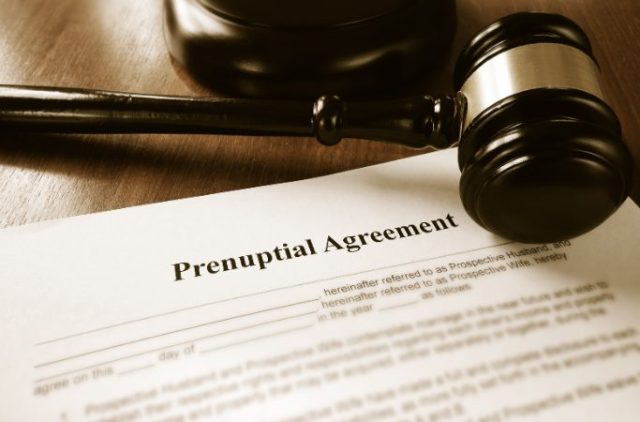What Should a Woman Ask For in a Prenup?
By Wilbert S
January 10, 2024 • Fact checked by Dumb Little Man

In today’s world of complex financial landscapes and evolving relationships, a prenuptial agreement stands as a beacon of security and foresight. Often perceived as a mere legal formality, its true essence lies in empowering individuals, especially women, to pave a clear path for their financial future.
A prenup, far from being a romance dampener, is a pragmatic tool that ensures both parties enter marriage with transparency, understanding, and agreed-upon terms. This essential document not only safeguards assets but also reflects a commitment to mutual respect and preparedness for life’s unpredictable twists and turns.
For women, in particular, navigating the intricacies of a prenup is not just about legalities; it’s about asserting their financial autonomy and securing their well-being. In an age where marital dynamics are continually evolving, understanding the nuances of a prenuptial agreement is crucial.
It’s not just about dividing assets like property or financial obligations; it’s about setting the groundwork for financial security and equality in a marriage. Whether it’s protecting premarital assets, planning for spousal support, or considering future assets, a well-thought-out prenup can be the cornerstone of a strong, forward-looking union.
Understanding Prenuptial Agreements

A prenuptial agreement, often simplified as a ‘prenup‘, is a legally binding contract created before marriage, detailing how assets and finances will be managed both during and after the marriage. Its primary purpose is to provide clarity and prevent disputes, should the marriage end in divorce or legal separation.
Prenups define the terms for property division, debt allocation, and spousal support, establishing a clear financial roadmap for the marriage. By setting these terms upfront, a prenup ensures that both parties’ expectations are aligned, promoting transparency and trust in the relationship.
Central to prenuptial agreements is the distinction between marital property (assets and debts acquired during the marriage) and separate property (assets and debts owned before marriage). Prenups play a pivotal role in safeguarding premarital property and separate debt, ensuring they remain in the possession of the original owner post-divorce. This distinction is vital, as it protects individuals from being unfairly burdened with their partner’s debts or losing their hard-earned assets.
Through a prenup, couples can mutually agree on how to handle not just their current finances, but also any future assets or financial obligations they might incur, providing a sense of security and fairness in the marriage.
>>Also Read: Arranged Marriage: Exploring the Pros and Cons of Traditional Matchmaking
Key Elements to Consider in a Prenup

Financial Security
A cornerstone of any prenup is ensuring financial security for both parties, particularly in the event of a divorce or legal separation. Prenuptial agreements serve as a proactive measure to outline how spousal support, property division, and debt protection will be handled, thereby mitigating financial disputes and uncertainties. They provide a clear framework for allocating assets, whether it’s dividing jointly acquired property or determining responsibility for marital debts. By addressing these financial elements upfront, a prenup ensures that each party’s financial well-being is safeguarded, regardless of the marriage’s outcome.
Property Rights
In a prenup, defining property rights is crucial. It involves distinguishing between marital property (accumulated during the marriage), separate property (owned prior to marriage), and nonmarital property (acquired individually during the marriage). This distinction is vital for maintaining fairness in property allocation. The agreement should mandate full disclosure of all assets and debts, ensuring that each party is fully informed about their partner’s financial situation. This transparency is key to preventing future disputes and ensuring that each individual’s property rights are respected and protected.
Business and Intellectual Property
For entrepreneurs and creatives, a prenup is essential in safeguarding business interests and intellectual property. These agreements can stipulate that such assets remain classified as separate property, protecting them from being subject to division in a divorce. This is particularly important for businesses or creative works that may increase in value over time, or for those that involve significant personal investment and effort. By clearly defining the ownership and rights of such assets in a prenup, individuals can ensure the security and continuity of their professional endeavors and intellectual contributions.
Family Considerations
Prenuptial agreements can also address complex family dynamics, especially when they involve children from a previous marriage, child custody, and support. These clauses help in outlining responsibilities and expectations regarding the upbringing and financial support of children. Additionally, an often-overlooked aspect is pet custody, which can also be included in prenups. These clauses ensure that there’s a clear, agreed-upon plan for the care and responsibility of pets, which can be as contentious as other family matters in the event of a separation.
Special Clauses in Prenuptial Agreements

Special clauses in prenuptial agreements often include tailored provisions like an infidelity clause, which stipulates financial repercussions in the event of unfaithfulness. This clause is designed to enforce fidelity and can significantly impact financial settlements if infidelity occurs. Another crucial element is the alimony provision, which outlines agreed-upon terms for spousal support post-divorce.
This becomes particularly important in scenarios where one partner may forego career opportunities for the marriage. Additionally, clauses recognizing the unpaid labor of a stay-at-home parent play a vital role. These clauses ensure that the non-financial contributions of a partner, often crucial for maintaining the household or raising children, are acknowledged and compensated in the event of a divorce.
The concept of lump sum payments in prenuptial agreements is another strategic component, especially useful in scenarios where ongoing payments are impractical or undesirable. These one-time payments, agreed upon in advance, can cover a range of obligations, from spousal support to settlement of shared property.
Lump sum arrangements simplify the division of assets and financial responsibilities, providing a clear, immediate resolution instead of prolonged financial ties. This approach can be particularly appealing for those seeking a clean and straightforward financial separation, ensuring that both parties have a definite and settled agreement to rely on post-divorce.
Financial Aspects

In prenuptial agreements, clearly defining financial responsibilities is essential for marital harmony. This includes agreements on how spouses exchange gifts, handle financial gifts from external sources, and manage each other’s existing partner’s debt. Moreover, the agreement should outline protocols for joint account management and bank account considerations for daily living expenses.
This level of detail helps prevent future misunderstandings by setting expectations about who is responsible for what financial aspects of the marriage. Whether it’s routine expenses or unexpected financial gifts, having these elements clearly laid out in a prenup ensures both partners are on the same page, reducing the likelihood of disputes over money matters.
Legal Considerations and Seeking Professional Help

When drafting a prenuptial agreement, it’s crucial that each party consults with their own attorney or a licensed attorney. This ensures that the interests of both individuals are independently represented and protected.
A family lawyer plays a pivotal role in this process, not only in crafting a legally sound document but also in ensuring that the agreement is fair and equitable. They bring expertise in family law, helping to navigate the complexities of marital agreements and ensuring that all stipulations comply with state laws and regulations. Their guidance is invaluable in creating a prenup that reflects the unique circumstances and needs of each couple, thereby minimizing the risk of future legal disputes and ensuring that both parties feel confident and secure in their agreement.
Preparing for Different Life Scenarios

A prenuptial agreement serves as a strategic tool in preparing for diverse life scenarios, offering a safety net for unforeseen circumstances. It addresses scenarios such as the passing of a spouse, outlining the distribution of assets to protect the surviving partner’s financial interests.
In the delicate matter of infidelity, prenups can specify consequences, differentiating between a faithful spouse and an unfaithful spouse. Additionally, in the event of a marriage failing, a prenup provides a predefined framework for asset division, minimizing conflict during a divorce.
It also foresightedly manages potential financial gains, future assets, and the inheritance of children, ensuring that wealth accumulation during the marriage and future financial prospects are equitably addressed. This foresight helps in maintaining fairness and protecting individual interests, irrespective of how the marriage evolves.
Conclusion
A prenuptial agreement is an indispensable tool for ensuring financial stability and clarity in a marriage. It acts as a practical roadmap, guiding couples through the complex terrain of marital finances and asset management. The importance of meticulously negotiating terms of a prenup cannot be overstated; it demands careful consideration of every aspect of one’s financial future and personal belongings.
By thoughtfully crafting a prenup, couples can lay a solid foundation for their union, one that is built on mutual understanding and clear expectations. This not only safeguards their individual interests but also strengthens the bond of the marriage, rooted in transparency and financial security.
>>Also Read: 5 Legal Issues To Consider And Address Before A Divorce
FAQs: What Should You Ask For in a Prenup?
Is a Prenuptial Agreement Legally Binding?
Yes, a prenuptial agreement is a legally binding contract if properly executed. It must be in writing, signed by both parties and entered into voluntarily, with full disclosure of assets and independent legal advice for both parties.
Can a Prenup Protect Future Inherited Assets?
Absolutely. A prenup can include provisions to protect future inherited assets, ensuring they remain as separate property and aren’t subject to division in the event of a divorce.
Does a Prenup Cover Child Support and Custody?
No, prenups typically do not cover child support or custody issues. These matters are decided by the court at the time of divorce, based on the child’s best interests.
Wilbert S
Wilbert is an avid researcher and is deeply passionate about finance and health. When he's not working, he writes research and review articles by doing a thorough analysis on the products based on personal experience, user reviews and feedbacks from forums, quora, reddit, trustpilot amongst others.




